- Home
- Jan-Philipp Sendker
The Language of Solitude Page 12
The Language of Solitude Read online
Page 12
“What awareness does she have of her surroundings?”
“None.”
“Will she get worse?”
“From a neurological point of view, it can hardly get worse. Inflammation of the lungs is a problem; of the skin too. Her husband must take care that she doesn’t get bedsores. I can’t tell you anything more than that.”
Paul couldn’t think of any other questions. He looked at Da Long, who was staring into space expressionlessly.
Dr. Zhou packed his things, politely declined an invitation to stay for lunch, and spared them platitudes, like how sorry he was not to be able to give them a better diagnosis. It was clear to see that he wanted to get back to Shanghai as quickly as possible.
Da Long walked the doctor and Paul out into the courtyard. Pretending to have forgotten something, Paul darted back into the house. He went over to Min Fang’s bed, pulled a clump of gray and black hair out of the hairbrush on the nightstand, tucked it into an envelope that he had brought from the hotel, and put it in his backpack.
He found it difficult to leave Da Long on his own, but he had to be back in Shanghai by five p.m., and Dr. Zhou had offered to give him a lift. Paul was sure that he and Da Long would see each other again—if his hunch was right, probably in a few days. A brief good-bye, and a promise to be in touch with Da Long from Shanghai before he flew back to Hong Kong.
Dr. Zhou drove a black Audi, a model favored by senior party cadres. The car was so new that the interior still smelled of rubber, plastic, and glue. He drove it quickly and skillfully down the narrow roads and wove his way between the container trucks on the highway so speedily that it was like taking part in a car rally.
Paul held on tight to the door handle and slid uneasily from side to side in his seat. “Great car. What’s the horsepower?” he asked, hoping to strike up a conversation, though he could not be less interested in cars.
“No idea. It’s my wife’s car,” Zhou replied.
“Is she also a doctor?”
“No. A Realtor. Doctors can’t afford Audis. They drive Passats.”
“Which hospital are you at?”
“People’s Hospital Number One.”
“Are you a good friend of Da Long’s son?”
“Yes. We have known each other for a couple of years. He bought two apartments from my wife. We see each other often.”
“I thought he worked for an insurance firm,” Paul said, curious.
“He does. He made a lot of money on the stock market and invested in property.”
“Did he tell you that two other older women in the village fell ill with the same symptoms?”
“No.” Zhou did not sound as though he wanted to turn around on the spot to go back to examine them.
“It’s strange, isn’t it?”
“Since I didn’t see them, I can’t say if there are similarities. To be honest, it sounds unlikely.”
“How do people get neurological diseases like that?”
The doctor shrugged. “Hard to say. Possibly something genetic that Da Long doesn’t know anything about. If we were in England and if Mrs. Wu worked in an abattoir or ate a lot of meat, I wouldn’t rule out mad cow disease. But BSE doesn’t exist in China.”
“Can cats carry the virus?”
A shake of the head.
“And fish?”
Dr. Zhou laughed out loud. “How should fish carry mad cow disease? It’s not called that for nothing.”
“Could it be something quite different? Poisoning, for example?”
“Are you a family friend or a detective?”
Paul ignored the question. “Yes or no?”
“I’m not a toxicologist, but there are certainly nerve poisons that can have those effects. But why would the old man want to poison his wife, and with what?”
Paul’s gaze fell on the clock on the dashboard. If they didn’t get stuck in traffic, he would get to the laboratory that his friend Zhang had found to do the tests for him before it closed. And with any luck, he would have an answer to this and other entirely different questions in no more than forty-eight hours.
VIII
* * *
The meeting of Death’s companions is drawing to a close. Da Long can hardly sit still. On the stage, a group of young girls in green uniforms is performing the dance of loyalty in honor of the Great Chairman. A man steps up to the podium, takes ahold of the microphone, and raises his voice. It is a powerful, vigorous voice, one that knows neither doubt nor moderation. It accuses. It makes demands. It threatens. The man hurls the sounds at them; he spits them out, hard, aggressive noises that fly over their heads like the cracks of a whip, punctuated by silences that increase the tension.
Da Long is among the hundreds of boys and girls squatting in long rows on the ground, listening intently. They don’t miss a thing; they clamor to turn the words into actions, waving their red books in the air and jumping up after the last sentence. They are indignant, full of rage. They shout loudly as one and stream into the street, forming groups, each of which is allocated two leaders and at least six strong young men. They swarm the length and the breadth of the city. No one will escape them today.
They are young; some barely more than twelve years old, but their faces are solemn; everything childlike has vanished from their eyes.
They are at war. At war against the old world. At war against old ways of thinking. Old culture. Old ways of doing things. Old habits.
They know their orders: stamp out the old, find the enemies. Enemies of the revolution. Enemies of the Great Helmsman. Who are everywhere. In the schools, in the factories, in the universities. In the home next door. In the families. Their own too.
“A revolution,” the man on the podium had declared, “is not the same as asking people to dinner or asking them to write an essay or paint a picture or do some delicate handiwork; it cannot be something so measured or noble. A revolution is an uprising, an act of violence, with which one class overthrows another.”
A revolution was not for doubters. A revolution recognized only two sorts of people: winners and losers. Da Long does not want to belong to the losers. He has seen what happens to them.
He walks down the main street with his group. They pass the office of the City Committee, and after a few minutes they are in front of the building they have been looking for. A building like any other. The plaster is crumbling from its gray façade, and laundry is hanging out to dry from the windows. In the communal kitchen on the ground floor, an old woman is chopping spring onions; she freezes with fear when she sees the Red Guards approach.
Da Long stays in the hallway while the others storm up the stairs. He hears the pounding of their footsteps on the wooden steps. He hears them hammering on a few doors, the way they keep running upstairs, higher and higher, in search of their victim. He knows what will happen any moment; he’s witnessed it firsthand often enough. They will hunt the enemy down in his hiding place. They will sweep the books from the shelves, take them out from under the bed, behind the closet, or under the floorboards if necessary. They will find the radio and destroy it, and the little altar and the handwritten notes on the works of Confucius. They will interrogate the wife and child, and they will not believe their lies. They will beat the man and the woman too, if they do not confess to the crimes he has committed. If they try to deny what cannot be denied.
They will drag him down the stairs, by the hair if needed, so that a people’s tribunal can sentence him. Every class enemy gets the punishment that he deserves.
It is pleasantly cool and dim on the ground floor. In the hallway, there are bicycles propped up against the wall, and under the stairs is a wheelbarrow with leftover lumps of coal; the door into the courtyard is at the end of the corridor. It is open, and light falls through it into the hallway. He knows this hallway. He knows it like no other. He walks toward the courtyard. With careful little steps. He goes further and stops at the doorway. He can still hear the voices from the top floor. They fill the whole hous
e. They fill the whole courtyard. They fill his whole body. But they calm him too, because they prove that he is not alone.
Then it is quiet. And even more quiet. A quick intake of breath that signals something cataclysmic. A dull thud. In the courtyard, right in front of his feet, lies a human being. Strangely twisted. A dark red liquid is trickling out of the mouth, flowing over the paving stones, and seeping into the gaps between them. It is a man. It is his father.
One of twelve enemies of the Great Proletarian Cultural Revolution who died violent deaths in those few hours in his city. Two were beaten to death. Four jumped from roofs or out of windows. One hanged himself. One drowned himself. One was run over by a bus while trying to flee. One of them burned to death in the flames of a library from which he was trying to save an armful of books. One of them broke his neck when his strength gave out and he lost his balance and toppled from the stage onto the street after ten hours of standing and waiting with his hands tied behind his back and a placard around his neck with the words I AM AN INCORRIGIBLE COUNTERREVOLUTIONARY on it.
The memory of that day does not occupy Da Long’s thoughts for long. There are more important things than family. The good of the party. The bloody battles between rival Red Guards. The times they live in demand sacrifices from everyone. To mourn that day would be a sign of decadent bourgeois thinking. A revolution cannot be a measured or a noble thing.
“Hard times create hard men,” President Zhou Enlai declares. Or is it the other way around: Hard men create hard times?
Many years later, Da Long will sit with Min Fang in a hut in the mountains of Sichuan, listening to the snow fall outside. It is dark and bitterly cold; she sings and recites poems to him. He will always remember a chapter from the Dao De Jing by Laozi:
The human being, when he is born,
is soft and weak,
and when he dies
is rigid and strong.
Plants are born
soft and tender,
and when they die,
are withered and stiff.
Therefore those who are rigid and strong
are Death’s companions.
The soft and weak
are Life’s companions.
Old wisdom. Classical Chinese wisdom, over two thousand years old. He listened to the lines and remembered the voices in the courtyard. The intake of breath that signaled something cataclysmic. The cold breath of death.
If anyone had shown him the poem before or if he had stumbled across it by chance in one of his parents’ books or in a book at school, it would not have meant anything to him. Old culture. Old habits. He would have torn it up or burned it, and denounced the owner.
They had been Death’s companions.
Hard times create hard people.
* * *
Half a year after his father’s death, he was sent to a far-flung corner of Sichuan Province for further training as a revolutionary. The party had decided to send the “young intellectuals” from the towns and cities, all those in high school and college, and all children of college graduates, to the countryside en masse. At fourteen he was actually still too young, but he volunteered, and because he had already shown impressive proof of his revolutionary fervor as a young Red Guard, he was allowed to become one of the youngest to follow Mao’s marching orders. He did not ask himself what Mao Zedong’s aim was with this movement, if it represented Mao’s intent to disperse the Red Guards, who had become more and more powerful and difficult for him to control, or if it was Mao’s final attempt to realize his dream of the “new man.” There had been only one answer for him: the Great Chairman was trying to create a purer, better human being, and Da Long was part of the privileged generation that Mao had designated for this fate.
Along with eight hundred other young people, Da Long arrived in a village about two days’ journey on foot from the nearest town. The first thing they saw was white columns of smoke that rose almost vertically into the skies. Before them, in the middle of a craggy, green mountainous landscape, was a collection of gray-brown shacks and houses spreading out from both banks of a river. Terraced fields surrounded the plain.
They were shown to a hut on the edge of the village. It had neither electricity nor running water. The walls of the hut were made of earth, rocks, and straw; stalks of straw were still sticking out in places. There was only one big room, with two raised brick platforms to sleep on; a fire could be lit under them so that the inhabitants wouldn’t freeze on cold winter nights.
The villagers were farmers who grew rice, corn, and vegetables. Da Long admired them from the start, and could hardly wait to learn from them. To his astonishment, he realized that the farmers, surly and suspicious people, did not welcome them with open arms, but had a hostile attitude to them. This was especially true of the party secretary, a short, sturdy man with hands like spades, a sharp, piercing gaze, and a long scar on his right cheek. He had survived various political purges unscathed and ruled the community like his own little fiefdom. He did not like any of these young people. To him they were nothing but parasites, weak city folk, the spoiled offspring of the intelligentsia, whom he despised. Whom did Mao have to thank for victory in the People’s Revolution? he asked the new arrivals at every opportunity. He left them in no doubt that there was only one answer to this question: the farmers. Not the college students, not the teachers, merchants, or workers. The farmers—men like him.
He disliked Da Long most of all. He thought he was a smart-ass, a typical city kid. Physically weak, clumsy with his hands, and not up to hard manual labor. He was annoyed by the excessive zeal that Da Long, trying to make up for his physical deficiencies, showed at the daily meetings to study the words of the Great Chairman. It gave him pleasure to show everyone in the village that this weakling, who considered himself a young fighter of the revolution, could not adequately complete his tasks. He gave him the heaviest baskets to carry, sent him on the most difficult treks to the most out-of-the-way fields, and made him dig deep ditches until he collapsed with exhaustion and had to be carried back to the hut by the others on piggyback. Even then, when Da Long was recovering on the thin straw bedding, he did not doubt the “revolutionary-spirited countryside dwellers.”
The rest of the group soon noticed whom the party secretary had it especially in for, so they limited their contact with Da Long to the strictly necessary. As though he had an infectious disease.
New people, same old behavior.
Two weeks after the Chinese New Year, the party secretary stormed into the hut and planted himself ominously in front of Da Long’s straw sleeping space. Where was his little red book with the words of Mao? he asked in a cutting tone.
In my jacket, Da Long replied, jumping up to get it.
Is that so, the man huffed, pulling a dog-eared and filthy book out of his coat pocket, holding it before his nose, and turning the pages with relish. Almost every page was stained with wet patches or muddy black smears, and even the red cover was barely recognizable under brownish-black mud. He had found it lying in the dirt near the river. In the mud! He concluded by flipping the cover open. There were two characters written on it: Da Long.
It must have slipped out of my pocket, Da Long stammered. There was no other explanation.
Don’t lie to me, you miserable little rascal, the man shouted, coming so near him that Da Long could feel the warm cigarette stink of his breath in his face. This won’t be the end of it, he added, his voice quivering with rage, before turning on his heel and stamping out into the cold.
Two hours later, Da Long found himself sitting opposite not only the party secretary and his two deputies but also the party leaders from the district capital, who were on an inspection tour of the region and just happened to be in the village for two days.
The wet and muddy book was passed from hand to hand to be leafed through and inspected with disapproving looks. The pitiful state of the volume was a clear sign of the young Red Guard’s disrespect for the political leadership. Did he
have anything to say in his defense?
Da Long said nothing, and they repeated their question. Harsh, brusque voices.
Da Long wanted to reply. He took a deep breath, opened his mouth, and lifted his tongue to the roof of his mouth, but expelled the air without producing any sound that could be understood. He looked into the serious faces of the comrades in front of him. It was a matter of carelessness, an accident, inexcusable, yes, but not deliberate. Nevertheless, he was ready to admit to anything they accused him of and to accept any punishment. Who was he to resist the will of the party? He couldn’t help thinking of his father, who was like a fat moth swooping in and setting on his thoughts at this moment. How must he have felt when he heard the Red Guards storming up the stairs? He could not have expected them, or he would have destroyed the papers hidden under the floorboards in the kitchen long ago. Had he any idea who could have betrayed him? What had his final thoughts been?
Da Long was silent for a long time. When his speech finally returned to him he stuttered and spoke in fragments. He repeated vowels involuntarily and struggled to produce the simplest sounds; he tried with all his might to control his speaking, but he had to make several attempts before he could pronounce the most basic words. Da Long had started stammering.
The party leaders from the city stared at him in amazement. Was this lout pretending, or was he really not able to speak properly? When his speaking did not improve after several minutes, they realized that it wasn’t an act, and merely gave him a long and insistent lecture on how to take care of the most precious words that Chinese wisdom had produced in five thousand years of history, the most precious words it would ever produce.
The functionaries left the village, but the stammer stayed. It made him even more of an outsider, one who now often worked alone in the fields and did not exchange a word with another human being for entire days.

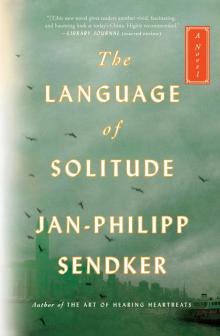 The Language of Solitude
The Language of Solitude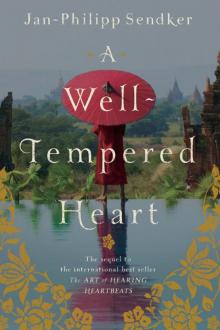 A Well-Tempered Heart
A Well-Tempered Heart The Art of Hearing Heartbeats
The Art of Hearing Heartbeats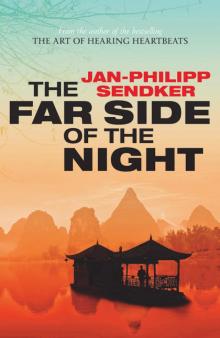 The Far Side of the Night
The Far Side of the Night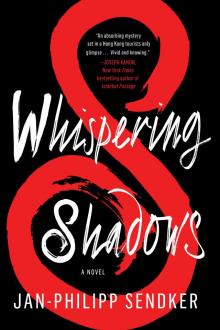 Whispering Shadows
Whispering Shadows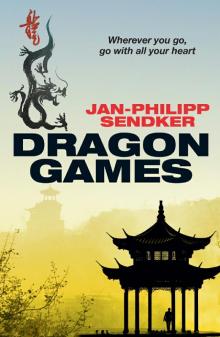 Dragon Games
Dragon Games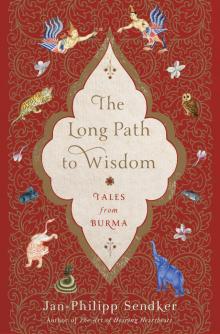 The Long Path to Wisdom
The Long Path to Wisdom